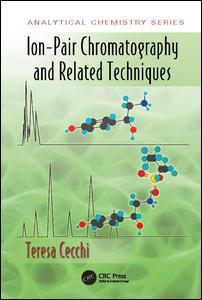Ion-Pair Chromatography and Related Techniques Analytical Chemistry Series
Auteur : Cecchi Teresa

Ion-Pair Chromatography (IPC) is a rapidly evolving method for difficult analyses of organic and inorganic ions and ionogenic, neutral, and zwitterionic compounds. The possibilities for this technology continue to grow as novel ion-pair reagents and strategies are introduced at an accelerated level. Compensating for a dearth in the literature, Ion-Pair Chromatography and Related Techniques details the basics and the evolution of this established and easily tunable technique and explains its influence on similar methods.
Theoretical modeling to application
Providing a thorough exploration of the multiplicity of interactions involved in an IPC system, this book emphasizes the progress from theoretical modeling to application. It explores the practical potential of IPC in the life science, medicine, pharmacology, forensic, food, and environmental sectors. It examines the upgrade of column technology and instrumentation to improve data quality and to increase sample throughput. The book also compares IPC to other instrumental methods of analysis and discusses the rising importance of the ion-pair concept in different analytical techniques.
Future endeavors
IPC has the potential to have lasting impact in the field of chromatography. Distilling the knowledge gained from preeminent research, this volume is a critical resource that is destined to stimulate future endeavors by separation scientists working in the area of high performance liquid chromatography.
Introduction. Electrolyte Solutions and Historical Concept of Ion-Pairing. Retention Modeling as Function of Mobile Phase Composition. Modeling of Retention as a Function of Analyte Nature. Stationary Phases. Developments in Column Technology and Fast IPC. Ion Pairing Reagents. Organic Modifiers. Role of Eluent pH in IPC. Temperature. Special IPC Modes and Variations. Detection and Combination. Examples of Applications. IPC versus Competitive Techniques. Ion-Pairing in Different Analytical Techniques. Non-Separative Applications of IPC. Conclusions and Future Research Needs.
Teresa Cecchi earned a Ph.D. in chemistry from Camerino University in Italy in 1997. She focused on environmental chemistry at Institute Fresenius Gruppe, Germany and served as a consultant to food chemistry laboratories. After working as a researcher at Camerino University on the SUPREME project titled "Pigmentation in South American Camelids," she concentrated on ion pairing chromatography; her major research interests encompass many aspects of this technique including retention modeling, unusual analytes such as zwitterions, and application of this technique to non-separative functions. Dr. Cecchi’s career and studies also span the fields of food packaging chemistry, natural dyes, electrochemistry, and the antioxidant activities of nutraceuticals. She acted as the organizer of a research group at Istituto Tecnico Industriale Statale (It is) Montani in Italy and taught as a contract professor at La Sapienza University in Rome. She is currently a contract professor on the Faculty of Science and Technology at Camerino University, teaching master’s level courses in chemistry and advanced chemical methodologies and a professor of analytical chemistry at ITIS Montani. Dr. Cecchi is also involved in "Teaching of Experimental Sciences" and "Scientific Master Degrees," two projects whose purposes are, respectively, to improve the methodologies of teaching physical sciences, and to encourage students to study scientific subjects. She is the author of over 50 research articles, reviews, congress lectures, and other communications and was the corresponding author of an article that received an award from the Italian Research Evaluation Panel.
Date de parution : 06-2017
15.6x23.4 cm
Disponible chez l'éditeur (délai d'approvisionnement : 14 jours).
Prix indicatif 87,11 €
Ajouter au panierDate de parution : 10-2009
Ouvrage de 232 p.
15.6x23.4 cm
Thèmes d’Ion-Pair Chromatography and Related Techniques :
Mots-clés :
Mobile Phases; Stationary Phase; chromatography; IPC Condition; ion pairing; Analyte Retention; reagent; Supercritical Fluid Chromatography; separative technique; Mobile Phase Concentrations; analyte; SUPERCRITICAL; Fluorescent Whitening Agents; CE; CZE; Thermodynamic Equilibrium Constant; ILs; ELSD; Van Deemter Equation; Free Silanols; Eluent Concentration; IPC; RP HPLC Retention; Van Deemter; Triethylammonium Bicarbonate; Hydrophobic Ion Pairing; Improved Peak Shapes; Adsorption Isotherm; Organic Modifier Concentration; Human Mitochondrial DNA



